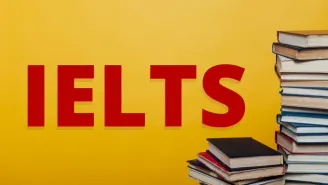Understanding the IELTS Writing
The IELTS Writing test is a crucial part of the IELTS exam, designed to assess your ability to express ideas clearly and coherently in written English. It consists of two tasks with different formats and question types for the Academic and General Training versions.
Here’s a quick overview of IELTS writing tasks:
Both tasks are scored on a band scale from 0 to 9 based on 4 key criteria:
- Task Achievement
- Coherence and Cohesion
- Lexical Resource
- Grammatical Range and Accuracy
The Writing module contributes 25% to your overall IELTS band score. A strong IELTS writing band score enhances your chances of meeting university, immigration, or job requirements. Since task 2 carries more weight than task 1, focusing on IELTS sample writing essays is essential to score well.
Now, let’s break down each task in detail.
IELTS Academic Writing Task 1
In Academic Writing Task 1, you must interpret and describe visual data. This could be in the form of graphs, charts, and tables. The task involves summarising the main points and supporting them with relevant details.
IELTS General Writing Task 1
General writing task 1 involves writing a letter based on a specific situation. The letter may be informal, semi-formal, or formal in style. This could involve requesting information, explaining a problem, or making a complaint.
IELTS Writing Task 2
Task 2 is common for both Academic and General Training. You must write at least 250 words on a topic, presenting an argument, opinion, or discussion.
Also Read: IELTS General Training Writing
Free IELTS Writing Practice Test
IELTS writing can only be perfected by practice! Preparing for the test is hard without practising IELTS writing examples, which allows you to become familiar with test format, time constraints and improve your writing skills.
Now, let’s check the free IELTS writing practice test with answers for both tasks in the next sections to boost your confidence on exam day.
IELTS Academic Writing Task 1
You’ll find a few downloadable PDF resources below to help you with IELTS practice test writing task 1.
IELTS General Writing Task 1
Below is a collection of downloadable PDF resources to help with your IELTS practice test writing task 1.
IELTS Writing Task 2
Check out the downloadable PDF materials provided for IELTS practice test writing task 2, including IELTS writing essay sample topics.
IELTS Writing Tips and Tricks
The IELTS Writing test challenges your ability to present ideas clearly and effectively. Whether you're tackling Academic or General Training tasks, these simple tips will help you excel:
For Task 1 (Academic)
- Understand the Visuals: Carefully study the graph, chart, or diagram. Highlight key trends and differences.
- Write Clearly: Start with an introduction, describe the main features, and compare data.
- Be Specific: Reference data points directly to support your observations.
- Mind the Time: Spend no more than 20 minutes on this task, leaving time for task 2.
For Task 1 (General Training)
- Know the Letter Type: Understand if it’s formal, semi-formal, or informal. Adjust your tone accordingly.
- Structure Properly: Include an introduction, body, and conclusion. Address the task’s purpose directly.
- Keep it Clear: Use appropriate greetings, closings, and paragraph breaks for a polished letter.
For Task 2 (Essay Writing)
- Understand the Question: Break down all parts of the prompt and address them.
- Plan Your Essay: Spend a few minutes organising your ideas before writing.
- Write Concisely: Stick to around 250 words, ensuring every paragraph has a clear purpose.
- Use Formal Language: Avoid casual phrases and keep your tone professional.
- Review and Edit: Save time to check for grammar, IELTS writing vocabulary, and sentence structure errors.
With consistent practice and a focus on clarity, you can confidently approach every section of the IELTS Writing test!
Common Mistakes to Avoid
Many students struggle with the IELTS Writing section due to common errors that can affect their band scores. Here are some key mistakes that you should avoid:
- Misinterpreting the question: Read the prompt carefully and ensure you address all parts of the question.
- Lack of structure: Follow a clear format: introduction, body paragraphs, and conclusion.
- Memorised Answers: Examiners can quickly identify memorised templates. Focus on originality and logical arguments.
- Ignoring Time Management: Practice writing within the 60-minute limit, allocating enough time for planning and proofreading.
Remember: Practice is key to improving your writing skills in academic and general training modules. Practice with various types of data and letter prompts to be well-prepared for the exam.
How can Leap be of help?
Ready to ace your IELTS Writing exam? LeapScholar is here to assist you every step of the way!
- Expert guidance from experienced IELTS trainers
- Personalised feedback to improve your writing skills
- Access to high-quality study materials and model answers
- Real-time exam simulation with timed practice tests
- Proven strategies to tackle all IELTS Writing tasks effectively
Take the first step towards achieving an 8+ band score by downloading our IELTS Prep app today and start practising with our IELTS writing mock test resources!










